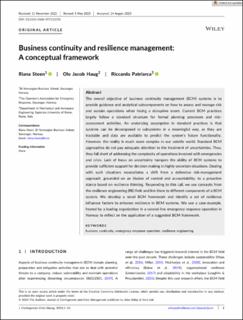Business continuity and resilience management: A conceptual framework
Peer reviewed, Journal article
Published version
Permanent lenke
https://hdl.handle.net/11250/3090060Utgivelsesdato
2023Metadata
Vis full innførselSamlinger
- Scientific articles [2181]
Originalversjon
10.1111/1468-5973.12501Sammendrag
The overall objective of business continuity management (BCM) systems is toprovide guidance and analytical subcomponents on how to assess and manage riskand sustain operations when facing a disruptive event. Current BCM practiceslargely follow a standard structure for formal planning processes and risk‐assessment activities. An underlying assumption in standard practices is thatsystems can be decomposed in subsystems in a meaningful way, as they aretractable and data are available to predict the system's future functionality.However, the reality is much more complex in our volatile world. Standard BCMapproaches do not pay adequate attention to the treatment of uncertainties. Thus,they fall short of addressing the complexity of operations involved with emergenciesand crisis. Lack of focus on uncertainty hampers the ability of BCM systems toprovide sufficient support for decision making in highly uncertain situations. Dealingwith such situations necessitates a shift from a defensive risk‐managementapproach, grounded on an illusion of control and accountability, to a proactivestance based on resilience thinking. Responding to this call, we use concepts fromthe resilience engineering (RE) field and link them to different components of a BCMsystem. We develop a novel BCM framework and identify a set of resilienceinfluence factors to enhance resilience in BCM systems. We use a case‐example,hosted by a leading organization in a second‐line emergency response operation inNorway to reflect on the application of a suggested BCM framework.

